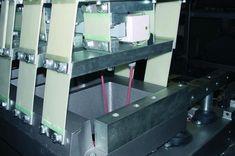
German manufacturer Affeldt is hoping its new Statera weighing machine proves a hit with potato packers when it begins to roll off production lines in September.
Sales agents Lammers & van Cleff are focusing on the UK market and sales representative Dean Chilvers is preparing to demonstrate the machine at the British Potato Exhibition in Harrogate at the end of November.
He says the company is hoping to regain market share lost to the previously faster radial weighing machines.
“Linear weighing machines were used heavily in the potato sector, but then radial machines came along and over the last few years they’ve taken over the market.
“They were considerably faster, but they were not as good at product handling.”
Chilvers says the new Statera answers the challenge posed by the radial machines and brings the added benefit of improved product quality through superior handling.
“Our machine has the speed of the radial weighers but it is much gentler when it comes to handling the product, it has much lower drops which makes a big difference. On the speed front it matches the radials easily.”
According to the company, the 16-head Statera is able to process one kilogramme of potatoes at over 100 packs per minute. During demonstrations, two clipping machines were added, running at over 50 packs a minute.
The system can be supplied in eight, 10, 12, 14 and 16 channels or load cells and can be tailored to fit into any system, says Chilvers. “Due to the modular build of the machine, it reduces delivery times and reduces the cost of the machine.”
To increase flexibility, the machine will be available in two models; the FF model, which is ideal for smaller weights at high speed, and the VB model, which has large weigh buckets so it can pack large weights at high speed.
Chilvers also points to the fact the machine’s removable parts, including buckets, makes it ideal for high care lines, as the equipment is very easy to clean.
A full-colour screen, with B&R controls ensures it is simple to operate and features a function that allows the machine to always run at its optimum, Chilvers adds.



